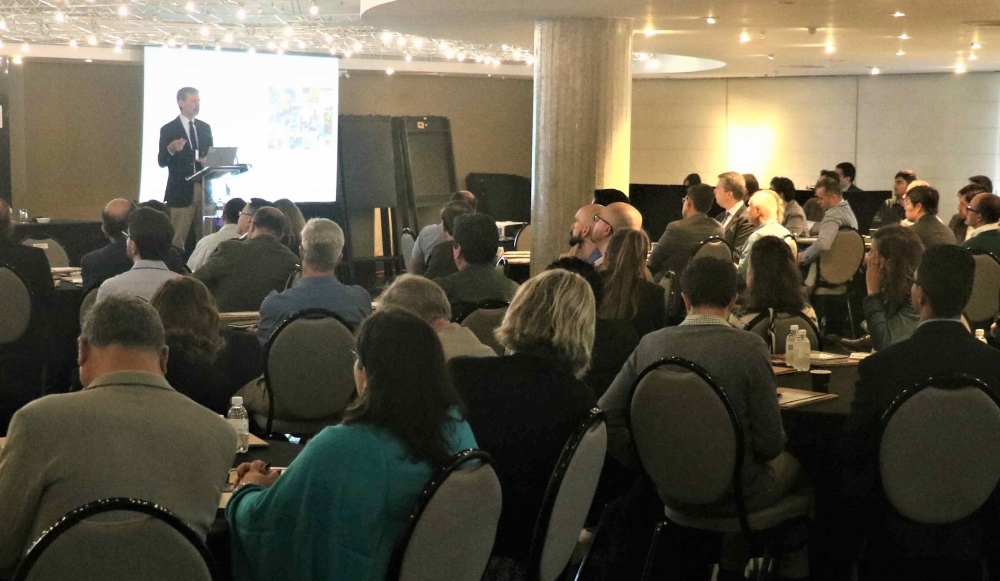

As one of the Engineering Research Centers supported by FAPESP, the new center will focus on R&D for next-generation deep-sea oil production systems (photo: Felipe Maeda / Agência FAPESP)
As one of the Engineering Research Centers supported by FAPESP, the new center will focus on R&D for next-generation deep-sea oil production systems.
As one of the Engineering Research Centers supported by FAPESP, the new center will focus on R&D for next-generation deep-sea oil production systems.

As one of the Engineering Research Centers supported by FAPESP, the new center will focus on R&D for next-generation deep-sea oil production systems (photo: Felipe Maeda / Agência FAPESP)
By Elton Alisson | Agência FAPESP – FAPESP and Shell have a plan to launch an offshore innovation center focusing on research and development for next-generation deep-sea oil production systems.
As part of the preparation for a call for proposals, a workshop held on March 3 in São Paulo assembled researchers from universities, research institutions and startups, as well as representatives of FAPESP and Shell, to discuss the main areas in which the new center will conduct research.
“We expect the ideas brought up at the workshop to help us select the topics for the call to be issued by FAPESP and Shell in the months ahead,” said Carlos Henrique de Brito Cruz, Scientific Director of FAPESP.
The areas to be investigated by researchers at the new center include new materials and nanotechnology, computer science and digital technology, health and safety, and sustainability and environmental management.
“The goal will be to do basic research and develop cutting-edge technology for deep-sea oil production,” said Jane Zhang, General Manager of Shell Technology Brazil.
“We plan to focus on disruptive and long-term transformational research and to tackle problems that are not obvious and are worth solving.”
Floating production units
One of the research lines will concern enhancements to the facilities and equipment used in floating production, storage and offloading units (FPSOs). Approximately one-third of the world’s FPSOs in use for the last 35 years are operating in Brazil, and several are nearing the end of their working lives and are prone to fatigue or corrosion crack growth.
In addition to this problem, larger and more complex FPSOs are needed to produce oil from the subsalt layer in the Santos Basin, according to José Ferrari, Shell’s Principal Topsides Research Engineer in Brazil. Topsides refers to the upper half of the FPSO’s structure above the waterline.
“Efficiency and safety throughout these vessels’ lifecycles can be enhanced by developing and implementing integrated sensors, for example, as well as data acquisition and recording systems, and real-time inspection reports,” Ferrari said during the event.
Another of the center’s research lines will relate to the development of subsea processing and production systems.
There are currently dozens of marginal oilfields in deep waters that do not meet the economic requirements for investment by oil companies.
“That is equivalent to tens of billions of dollars in idle assets,” said Rosane Zagatti, Shell’s Subsea and Topsides Technology Manager.
If production in these marginal oilfields is to be made viable, then the time taken to design and develop innovative technology will have to be reduced, Zagatti said.
Broad partnership
The new center will be the third launched in partnership with Shell under the aegis of FAPESP’s Engineering Research Centers program (ERC).
The first was the Research Center for Gas Innovation (RCGI), hosted by the University of São Paulo’s Engineering School (POLI-USP).
The second, launched in 2018, was the Center for Innovation in New Energies (CINE), with units at the University of Campinas (UNICAMP), the Nuclear and Energy Research Institute (IPEN), and the University of São Paulo’s São Carlos Chemistry Institute (IQSC-USP).
“The ERC program aims to link up researchers in universities, research institutions and companies so that they can work together on advanced long-term research projects,” Brito Cruz said.
“The ERC program has grown very fast. It is already one of Brazil’s largest academia-business collaborative research initiatives.”
Republish
The Agency FAPESP licenses news via Creative Commons (CC-BY-NC-ND) so that they can be republished free of charge and in a simple way by other digital or printed vehicles. Agência FAPESP must be credited as the source of the content being republished and the name of the reporter (if any) must be attributed. Using the HMTL button below allows compliance with these rules, detailed in Digital Republishing Policy FAPESP.





